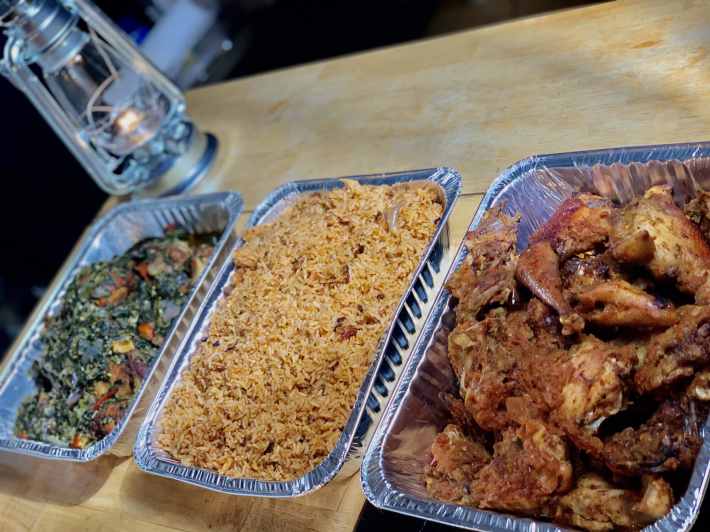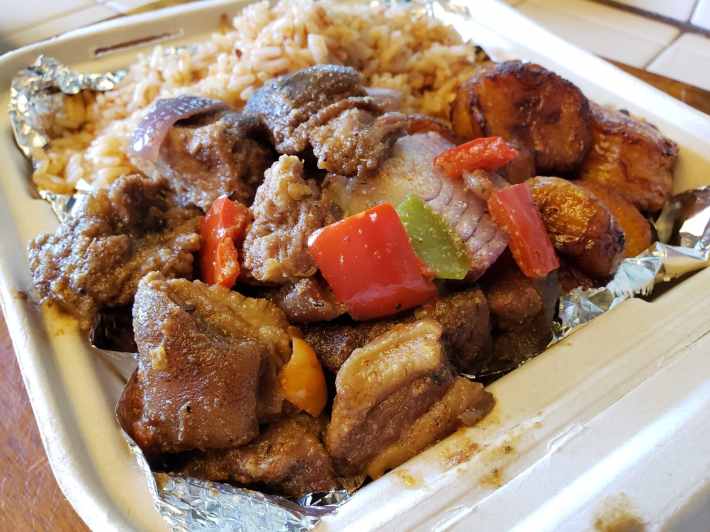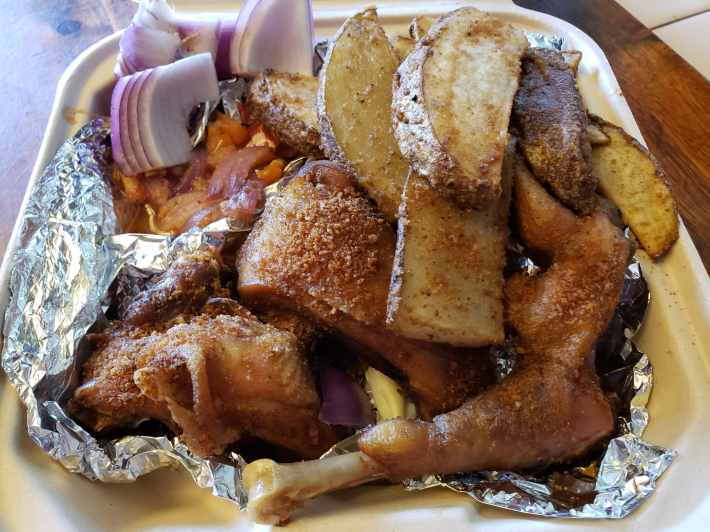Chef JohnPaul “JP” Arabome would like you to call him daddy.
“Goat Daddy,” to be specific.
The 38-year-old Van Nuys resident is the founder of The Peppered Goat, a new concept delivering West African cuisine to Southern California’s scattered Nigerian diaspora and other chivo-starved Angelenos.
The menu centers on asun, the Nigerian and Yoruba specialty of spicy roasted (traditionally smoked) goat meat that graces every worthy owa mbe (customary food-and-drink-fueled celebration).
Arabome spends a day-and-a-half preparing the dish for customers, who tend to be based in Nigerian expat strongholds including Hawthorne, Inglewood, and Van Nuys.
Growing up in the southern Nigerian city of Benin as the last of nine children in a Catholic family, Arabome always had big aspirations. But his ascension to a goat virtuoso was nothing he would have predicted.
“I was never really a cooking type as I was the youngest, so I didn’t go near the kitchen,” he tells Taco.
After boarding school and two years of college in Nigeria, Arabome moved to Minnesota at age 19 to finish his economics degree, followed by a move to L.A. to receive his MBA.
He went on to work as a consultant for companies like Bank of America and Countrywide Insurance. After more than eight years of the corporate grind, he abruptly called it quits to continue his focus on digital media, which included running his own production warehouse in Chatsworth.
When business took a downturn in 2014, Arabome returned to Nigeria for an extended stay in Lagos to concentrate on screenwriting. In between finishing scripts, he was bitten by the culinary bug.

The produce markets in Lagos, with their woven baskets brimming with colorful fruit and vegetables, captivated him. He was the rare male customer and would also have to dress “real street” to avoid the tourist prices his Americanized accent would inevitably incur.
“In Nigeria, the women go to the market and always do the cooking,” he says. “Not in my house. I did all the cooking. I just enjoyed all the really fresh, organic vegetables. I was there for the love of food and would just cook and try different things.”
After bringing his bounty home, Arabome recreated West African specialties like jollof rice, akara fritters, vegetable soups, and asun—his favorite street food—developing an enthusiasm for home cooking and entertaining. After returning to the States in 2016, he continued perfecting these dishes, sometimes piquing the interest of friends. It wasn’t until January 19, 2019, that he finally cooked for his social circle while they gathered at the goat chef’s house on his birthday.

“My mom was always saying, ‘You need to open a restaurant,” Arabome says. “Then my sister told me, ‘JP, you need to follow your dreams, I think cooking is your calling.’”
“I was like, ‘I don’t know about that.’”
"She said, ‘If Mom is praising your cooking, then you better believe it.’”
Wider encouragement came when he bought half a goat and staged his first pop-up at a Winnetka bar.
“People kept telling me, ‘White people don’t eat goat, white people don’t eat spicy,’” Arabome says. “It was sold-out in two hours. This is L.A. People are open to trying stuff.”
But it took COVID-19 and an uncertain state of employment for Arabome to kickstart The Peppered Goat, which debuted in late March with pick-up and delivery. Four months later, he tells Taco he is going through two to three whole goats a week.

Goat Daddy’s asun, translated to “peppered goat” on his menu, comes in sizable, skin-on cuts swimming with chile, wedges of bell pepper, and red onions.
Central to the big flavors of the asun experience is a balance of searing and savory that finds the spiced goat meat’s unmistakable essence merging with hiccup-inducing habanero heat that scorches the tongue but doesn’t overstay its welcome. Arabome’s careful preparation of asun employs every meaty part of the animal, minus its head and organs. Using whole goats from a Corona slaughterhouse, he seasons the meat with fresh local spices, before it is boiled, deboned, grilled on charcoal, and lastly, sautéed with the habanero, bell peppers, and onion.
Savory jollof rice and caramelized plantains serve as texturally suitable sidepieces, the former providing neutral mooring for the goat’s intensity and the latter a soft, honeyed counterpoint.
For those who are experienced with broth-soaked birria, Jamaican goat curry, or the heugyeomso-tang at Mirak, Arabome’s asun is a somewhat sturdier affair, with a durability he tries to balance to meet diverse expectations and preferences in the Nigerian community who frequent him.
Even the tenderness of the meat is subject to cultural preference. “Some Nigerians say they want it stronger, or even hard, to feel the work of chewing, but most people like it soft,” he tells us, conceding he’s also had to halve the heat for a wider swath of palates. “So I try to find the middle ground.”
No matter one’s estimation of its consistency, the enormous flavor is undeniable.

In addition to asun, the chef also offers chicken, goat, or turkey suya, Nigerian chicken stew, and, with audience accessibility in mind, goat burgers and goat tacos.
All items are $20 though bigger party-trays and catering stints are proving popular for celebrations in L.A.’s Nigerian households.
Arabome has carried many titles his nearly 40 years:
Economist.
Director.
Writer.
Even Uber driver.
But “goat daddy” may be the one that ultimately endures.
His dream is to turn his Nigerian food business into a Los Angeles sensation and someday, hopefully, an internationally recognized franchise.
“I want the next president of America to come to L.A. and be like, ‘Hey, you gotta try The Peppered Goat,” Arabome says. Emphasis on next.
The Peppered Goat, order online







